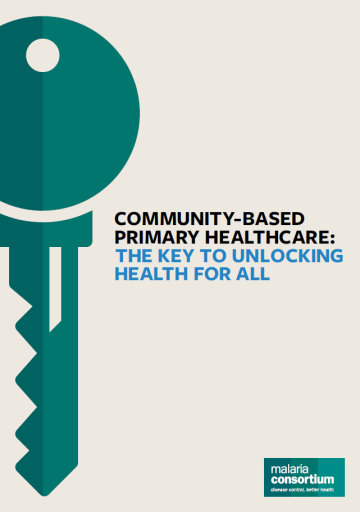Community-based Primary Healthcare: the key to unlocking health for all
2 August 2017
Community-based primary healthcare has potential for delivering health services to hard-to-reach and under-served communities, and for achieving the Global Goals on health, says a new report published by Malaria Consortium
Despite advances in global health over the past few decades, many of the poorest people living in rural communities still lack access to critical health services. According to the World Health Organization, 5.9 million children die from illnesses that are easily preventable and treatable, and over 300,000 women die from maternal complications every year.
Community-based primary healthcare (CBPHC) is being increasingly recognised, by donors and governments alike, for the great potential it has for extending vital health services to the hardest-to-reach communities. The report, Community-based Primary Healthcare: the key to unlocking health for all, calls for the scaling up of the CBPHC approach in order to deliver health services at the community level, tackle the growing global health worker shortage and support the achievement of universal health coverage.
“Ultimately, this is the sure way of sustainably ensuring that the people are in charge of their healthcare and destiny”, says Right Honourable Dr Ruhakana Rugunda, Prime Minister of Uganda, upon receiving the report.
CBPHC involves the use of community health workers (CHWs), who are volunteers selected from their local communities. CHWs are trained to provide basic prevention, diagnosis and treatment for the most common childhood illnesses, including malaria, pneumonia, diarrhoea, acute malnutrition and neglected tropical diseases (NTDs). They educate communities about disease prevention, hygiene and good health, and can play an important role in other health interventions, such as supporting mass drug administrations and mosquito net distributions.
As evidence of the effectiveness of CBPHC grows, technological innovations have driven increased interest in CBPHC. The use of mobile technology (mHealth) is gaining attention for its ability to help CHWs provide good quality health services. In Mozambique, for example, Malaria Consortium has designed and is now scaling-up a digital health platform that uses a smartphone application to support CHW decision-making and to collect community-level health data that will aid government in their delivery of health programmes.
By utilising CHWs that are embedded in the heart of communities, CBPHC programmes create an important link with the formal health system. This also makes CBPHC an essential vehicle for achieving first, the Global Goal on health, and secondly, contributing to the wider Global Goals.
One example of this is in Uganda, where Malaria Consortium has established village health clubs through a project that aims to improve access to health services for childhood diseases and maternal and newborn care. Village health clubs provide a forum for all community members to discuss the health problems facing their community, and then find solutions that are locally appropriate. Thus, through the village health clubs, communities have begun to own their own healthcare. Using health as a gateway, communities have been taught the power of collective action, and have become empowered to solve other problems, such as improving the infrastructure in their village, caring for the elderly and disabled, improving water sources, providing transport for the vulnerable and improving livelihoods.
In order for CBPHC programmes to be successfully implemented, thus contributing to achieving universal health coverage and the Global Goals, the report recommends that:
- National governments to invest in scaling up CBPHC programmes, and coordinate the various actors delivering CBPHC to ensure synergy rather than fragmentation
- Donors to provide funding for the development of CBPHC programmes that will demonstrate their viability, and then support a phased transition to national funding and ownership
- Development partners and academia to conduct research to establish how to scale up CBPHC successfully and ensure integration with the formal health system. Sustainable models of CBPHC that will work in different contexts need to be developed.
“This report is an important reminder that quality healthcare is a right, and should be accessible and affordable to all”, says Dr James Tibenderana, Malaria Consortium’s Global Technical Director. “Much has been achieved in recent years, however, more is needed to make universal health coverage more than a distant hope for many countries. In addition to strengthened facility-based care, this can be realised through adequately funded and successfully implemented CBPHC programmes.”
The report’s recommendations will be discussed at a high level roundtable event in October 2017, hosted by Dr Daniel Poulter MP, Chair of the All-Party Parliamentary Group on Global Health. A summary of the discussions will be available after the event.
Keywords: Maternal, neonatal and child health | Community delivery | Advocacy and policy
Related content
25 July 2017
Community-based primary healthcare: The key to unlocking health for all
Latest news
- International summit calls for AMR accountability in public health interventions21st March 2024
- Global SMC community celebrates new milestone at SMC Alliance Annual Meeting in Nigeria6th March 2024
- Scaling up key interventions could halve pneumonia-related childhood mortality13th February 2024
- Malaria Consortium and eGov Foundation join Mozambique’s national malaria programme to digitalise seasonal malaria chemoprevention campaigns8th February 2024
- World’s first malaria vaccine rollout launched in Cameroon22nd January 2024
- Digital solutions driving equitable access to health6th December 2023